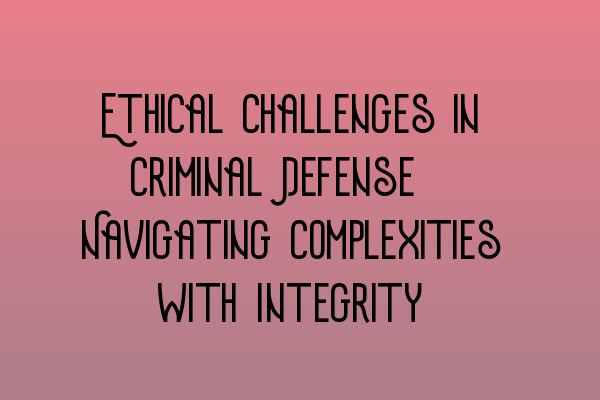Ethical Challenges in Criminal Defense: Navigating Complexities with Integrity
As a criminal defense solicitor, one of the most important aspects of your role is navigating the ethical challenges that arise in this complex field. Criminal defense cases often involve high stakes, as they can determine the freedom and future of your clients. It is crucial to maintain a strong sense of integrity while representing your clients and upholding the principles of justice.
The Importance of Ethical Conduct
Conducting criminal defense work ethically is not only a legal requirement but also a moral obligation. Upholding ethical standards ensures that your clients receive a fair trial and that justice is served. It establishes trust between you and your clients, the judiciary, and the wider community. Ethical conduct is the foundation of a just and functioning legal system.
One of the key ethical challenges faced by criminal defense solicitors is the duty to uphold the principle of confidentiality. Protecting client confidentiality is paramount to maintaining trust and ensuring open communication with clients. This duty extends even after the case has concluded, as clients may disclose sensitive information during the course of their defense.
Another ethical challenge is the duty to act in the best interest of your client, even when faced with conflicting principles. Balancing your duty to your client with your duty to the court requires careful navigation. While advocating for your client’s interests, you must also adhere to the rules of evidence and present the case in an honest and truthful manner.
Navigating Ethical Challenges with Integrity
Integrating ethical principles into your criminal defense practice is essential for maintaining your professional reputation and ensuring the best outcome for your clients. Here are some strategies to navigate ethical challenges with integrity:
- Continual Professional Development: Stay updated with the latest legal regulations and ethical guidelines. Continuing education and training will equip you with the knowledge and skills necessary to confront ethical challenges effectively.
- Open and Transparent Communication: Maintain open lines of communication with your clients, ensuring they are fully informed about the legal process, their rights, and their options. This fosters trust and allows for informed decision-making.
- Seeking Expert Advice: When faced with complex ethical dilemmas, seek advice from legal experts or bodies, such as the Legal Representation for Delaware LLCs in the UK. Their expertise can provide valuable insights and guidance in navigating challenging situations.
- Internal Code of Conduct: Establish an internal code of conduct within your firm that emphasizes ethical practices. This serves as a guideline for all team members and helps create a culture of ethical conduct.
Conclusion
Ethical challenges are an inherent part of criminal defense work. Navigating these complexities with integrity is fundamental to upholding the principles of justice and ensuring the best representation for your clients. By embracing ethical conduct, staying informed, and seeking guidance when needed, you can navigate the challenges with professionalism and integrity.
For more information on legal representation for Delaware LLCs in the UK, ensuring ethical business practices, and overcoming legal challenges for UK businesses in the U.S., check out these related articles:
- Legal Representation for Delaware LLCs in the UK: Expert Advice
- Ensuring Ethical Business Practices: Delaware’s Code of Conduct
- Legal Challenges for UK Businesses in the U.S.: Strategies for Overcoming Hurdles
- Legal Challenges for UK Businesses in the U.S.: Strategies for Overcoming Hurdles
- SQE Exam Prep: Essential Study Materials for Aspiring Solicitors
